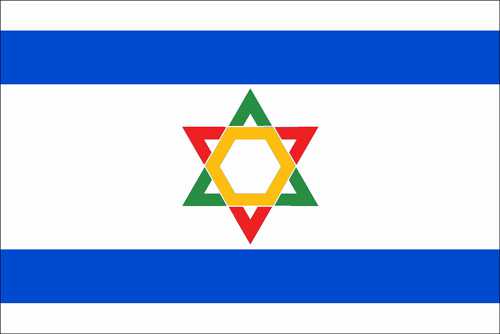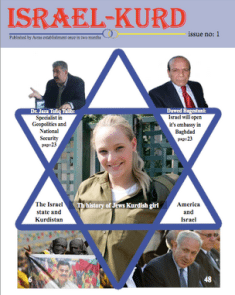
By KSENIA SVETLOVA
Kurds in northern Iraq are reaching out to a group of people with whom they believe share a historic ethnic connection, and many common enemies. You guessed it, it’s us.
It’s early morning in Irbil, capital of Iraqi Kurdista (sic.). A few men gather around a small kiosk where dozens of newspapers and magazines in Arabic and Kurdish are carefully arranged on a piece of cloth on the ground.
The camera zooms in and concentrates on one of the men, who holds a glossy magazine with a large Magen David on the cover. This is not another illustration to an article about Israeli policies in Gaza and West Bank. The title is “Israel-Kurd” and the whole edition is dedicated to relations between the Kurdish nation and the State of Israel.
 The anchor of American-funded Al- Hurra TV, who reads the introduction to the Israel-Kurd item, seems just as astonished as the customers at the newspaper stand in Irbil – it’s not every day that you see Israel’s name mentioned in a context other than the Arab-Israeli conflict.
The anchor of American-funded Al- Hurra TV, who reads the introduction to the Israel-Kurd item, seems just as astonished as the customers at the newspaper stand in Irbil – it’s not every day that you see Israel’s name mentioned in a context other than the Arab-Israeli conflict.
In Iraq, publishing a magazine with the word Israel on its cover is a risky business, considering the generally negative attitude toward Israel and those in the Arab world who seek rapprochement with the Jewish state.
“During last year we were often intimidated and threatened by different elements who didn’t like what we do, but this year it seems that people are more understanding and interested in our product,” says Hawar Bazian, managing editor of the magazine. Bazian was born in Iran and fled the country with his family, finding refuge in Irbil. Although he has lived there for many years and completed his BA in English literature at Irbil University, he doesn’t have Iraqi citizenship and is not able to further pursue his education.
Bazian believes there are many similarities between Kurds and Israelis and says that his publication, which was established two years ago, is meant to build a cultural bridge between the two nations.
Obviously, not everybody in Irbil and beyond agrees with him and Mawlood Afand, the editor-in-chief and founder of the magazine. In addition to threats and intimidation, the Web site of the magazine has twice been hacked by Turkish users and the authorities have not given it a work permit.
“There are two approaches to Israel in Iraqi Kurdistan,” Bazian says. “There are those who are very interested in relations with Israel and eager to learn more about it, and those who hold quite a negative view of this country, being influenced by radical Islamic ideology.
They think that Israel is the enemy,” Bazian told The Jerusalem Post.
SINCE THE Israel-Kurd association hasn’t received a permit from the Iraqi authorities, there are no offices, computers or faxes – the association exists on-line and publishes a monthly magazine in Kurdish. The Web site is also available in Arabic, English and Turkish.
Some articles are also available in Hebrew. The banner, “Let’s know Israel as itself,” promises an insight into Israeli society and history.
The Web site mainly offers news from the Kurdish world and Israel and op-eds and analysis on different developments in the Middle East by Kurdish, Israeli and American contributors.
“We are the result of the historical suffering done by the Persian, Arab and Turkish nations against the Kurds, who lost their national, religious and cultural rights. These enemies try to destroy our future as well as our past. The Israel-Kurd Institute tries to mention a historical relationship between Kurds and Jews and review this relation without any religious or ideological concerns.
So we have a clear message which talks about an honorable and great historic stage of the Kurdish nation that belongs to Kurdish-Jewish relations. We will use this for the Kurds’ sake and for the sake of their national question,” the “About Us” sections of the on-line magazine states.
“Not only do Israel and the Kurds have mutual interests and historical ties between their peoples, but also many common enemies,” says Bazian and starts to count: Iran, Syria, Turkey, the Arabs – almost everyone in the Middle East. That is exactly why, he believes, the Kurds and the Jews, two ancient nations who endured enormous suffering and were stripped time and again of their natural rights, should join forces and cooperate.
Some Kurdish contributors go even further and suggest that Jews should come to Kurdistan and help build the national Kurdish home. “Kurdistan will be the second home for Jews after Israel,” believes Hamma Mirwaisi, author of Return of the Medes. “Kurds always have treated Jews as equal partners in Kurdistan since the Median Empire. It may be because Abraham, the forefather of the Jewish nation, was an Indo-European Kurd (!) instead of an African Semite like the Jewish scholars have been claiming after Moses came back from Egypt. Or a large segment of the Kurdish populations are the descendants of the lost 10 Jewish tribes after they were exiled by the Assyrian Empire to Kurdistan. Whatever the reasons, the Kurds are treating Jews equally, even if Islamic clerics are encouraging them otherwise.
“Kurdistan can absorb millions of Jews, because it is a large territory and in need of the Jews’ knowledge. Jews and Kurds can be a blessing for one another and live in peace and prosperity for generations to come.”
Other articles and op-eds printed in the magazine discuss the recent deterioration in relations between Israel and Turkey. “Turkish Prime Minister Recep Tayyip Erdogan describes Israeli soldiers as ‘murderers’ or the Israelis as ‘barbarians,’” notes one writer. “I believe it’s the other way around; the Turkish soldiers are the true murderers, not the Israeli soldiers. Israelis are defending their ancient Holy Land of Israel, but Turkey occupied the Kurdish holy land of the Medes. They are occupiers and murderers.”
“Turkey should be held liable for all the damage that was caused to Israel during the Hamas-supported events, also for damage caused to the Kurds.
Turkey, with all the support that they get from the Israeli Government and Unites States, still cannot face the Kurdish Freedom Fighters. I wish that the Israeli Government from now on will be able to support the PKK Freedom Fighters (read terrorists) against the Turkish Government in order to support human rights and stop the violence against innocent Kurdish people.”
BAZIAN SHARES THIS point of view and believes the way Israel dealt with the Turkish flotilla was appropriate and understandable. “We were watching carefully the developments around the Turkish flotilla, and we were amazed by the international reactions.
After all, Israel has every right to defend its borders. We would understand if some other state, such as Iran, which is known for its provocations, would do something like this, but Israel is a very normal country. So I think that it was legitimate what happened there.”
Bazian says he would love to visit Israel some day, but now it still seems a far off dream as there are no diplomatic relations between Iraq and Israel. But Kurds are used to being patient, he says, and good things come to those who wait, as the proverb has it. “Any diplomatic relations have their stages. In the beginning there is communication and establishing of cultural bridges, which is exactly what we are doing.
It might take time until things change, but Israel has to know it has a good friend in the Middle East, perhaps its only friend,” he concludes.
https://www.jpost.com/Features/In-Thespotlight/Israel-our-ally, 31/08/2010
